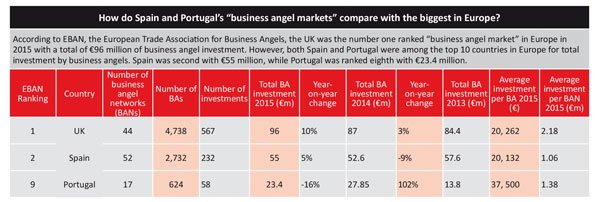Take a chance on me

 Despite their economic difficulties, Spain and Portugal are seen as fertile ground for tech start-ups as office space is cheap and the salaries for IT engineers are relatively low – but does the sector represent a big opportunity for law firms?
Despite their economic difficulties, Spain and Portugal are seen as fertile ground for tech start-ups as office space is cheap and the salaries for IT engineers are relatively low – but does the sector represent a big opportunity for law firms?
Given that there are not always significant legal fees to be earned by advising a start-up, some lawyers at major firms view such work as a waste of time. “An entrepreneur may have a great idea, but it may not be a valuable use of our time,” admits one partner at a leading law firm in Spain. However, plenty of firms in Iberia are willing to bet on the potential future success of a start-up in the hope of winning more lucrative instructions from the company if it is successful, or even clawing-back fees at a later date for work done on a complimentary basis. The start-up sectors in Spain and Portugal are thriving and with both countries having among the most successful “business angel markets” in Europe, start-ups are able to tap into an ever-growing source of funding.
Cuatrecasas, Gonçalves Pereira partner Pedro Fernández says the start-up sector in Spain is presenting major opportunities for law firms who are advising entrepreneurs, investors, venture capitalists and business angels [affluent individuals that provide capital for start-ups] that are active in the Spanish security, biotech and mobility (for example, smart cars) sectors. In addition, Fernández adds that private equity funds are also taking a greater interest in the start-up sector and are investing in businesses at an earlier stage in their development than they would have done in the past.
Even though start-ups, by definition, have relatively small budgets, Fernández says they are increasingly prepared to spend big on legal advice. “If you’re entering an investment round, it’s to raise money – start-ups are willing to use a big law firm because it’s a very important time for the company,” he says. Fernández says that some law firms may advise a start-up in the hope that, while the fee-earning potential is minimal at the start-up, if the business becomes more successful it will generate more lucrative work in future. But he acknowledges there is a risk that as a start-up gets bigger, it may switch to a different law firm. However, he adds: “If you help an entrepreneur from scratch and you are a ‘tier one’ law firm, you are in a good position.”
Uría Menéndez partner José Soria says that, while advising a start-up on the “seed phase” of its development may not be an “easy fit with a large law firm”, there are still ways for such firms to work with the entrepreneurs. He describes Uría Menéndez’s approach as offering advice to start-ups on matters such as “investment agreements, shareholder agreements, stock option plans and tax advice”.
Fees not main consideration
Billing is not always the main factor under consideration when deciding whether or not to represent a start-up, says Soria. “Start-ups are very innovative – the clients are often young people with a lot of energy and ideas and this is something to take into consideration,” he adds. Soria says Uría Menéndez has created a start-up team that supports, among others, start-up accelerators by providing legal seminars, for example. In addition, advising business angels is another opportunity for lawyers, according to Soria, who describes it as a “growing area” and says there are a lot of networks for business angels in Spain (see box).
It used to be the case that start-ups did not set aside much money for legal services, but that is no longer the case, according to Luis Casals, partner at Baker & McKenzie. “Start-ups can’t take risks,” he says. “If a start-up has a good law firm backing them, it helps with investment.” Casals acknowledges that sometimes, when advising a start-up, a law firm can lose money, but he adds that there are many things to be learned and that when deciding to represent a client, “there is always the expectation that the project will explode”. He cites the example of property website Idealista, which Baker & McKenzie has represented: “That was a start-up once,” he says. Casals adds that Baker & McKenzie often has a “gentleman’s agreement – nothing in writing that we’ll charge the client less, but if things go well, we’ll work at market rates”. But he adds: “It’s not pro-bono, even small companies have a budget for legal services.”
Work for start-ups has convinced some law firms of the value of creating “spin-off” initiatives to provide structured support for such businesses. One example is Cuatrecasas ACELERA, a programme that supports entrepreneurs in the legaltech sector by providing them with mentoring and training. However, there are doubts about the viability of law firms in Spain becoming shareholders in spin-off businesses providing support for small businesses in the mould of, for example, Riverview Law, of which DLA Piper is a shareholder. “There’s a risk of not focusing on what you’re doing,” says Casals. “Baker & McKenzie doesn’t set up spin-offs for conflict reasons: if you become a shareholder in the project, you could come into conflict with other shareholders and then you’re right in the middle of it.”
The start-up sector is having a significant role in shaping the dynamics of the legal market. Alejandro Touriño, managing partner at Ecija says: “We are now seeing some very interesting law firms only acting for the start-up ecosystem, that is entrepreneurs, venture capitalists, accelerators and so on.” He adds that, regarding the opportunity for law firms to create spin-off businesses, “I am not sure this is the right option”.
Touriño says that, while there are not many business angels in Spain, there are some wealthy individuals investing in successful start-ups. “Spain is not the best country in Europe for entrepreneurs,” he says. “But every day we see more and more amazing projects that are starting their internationalisation process and others that obtain amazing funds.” Touriño argues that such an environment is good for creating a “business angel culture”.
Portugal: Start-ups creating jobs
The start-up sector in Portugal is creating many opportunities for law firms, according to PLMJ partner Daniel Reis. “The start-up community in Portugal, and particularly in Lisbon, is currently experiencing great dynamism and exponential growth, which means lots of companies are seeking legal advice,” he adds. Reis cites data that shows between 2007 and 2014, start-ups were responsible for 18 per cent of all jobs created in Portugal. “Although companies operating for more than 20 years continue to represent a large part of our economy, recent studies have shown that they now represent less than a quarter of the Portuguese business sector.”
Indeed, legal advice for start-ups is a rapidly growing area, according to MLGTS associate Luís Roquette Geraldes. “We’re working with accelerators and we’re working with a lot of start-ups in the biotech, medtech and fintech sectors as well as consumer marketplaces,” he adds. Roquette Geraldes says the work includes advising on funding rounds, employment advice, and advice on licensing in the medtech sector, for example. He acknowledges that the firm may initially lose money when advising start-ups in the early stages of their development as some legal work is “done for free”, but adds: “We offer a lot in terms of scalability, we can reach 150 jurisdictions through our network, which is invaluable for a scalable tech company, for example.”
Pbbr partner Alexandre Jardim says that, while start-up projects entail risk, there are fee arrangements that “accommodate that risk”. He adds that these entail “lower fees in an initial phase that may be recovered later, being conditional upon investment rounds or exit by acquisition by a bigger player”. Jardim adds: “In the event of an exit, if the buyer wants a change of legal services to the buyer’s law firm, the client will be aware that it is not advisable, because it risks conflicts of interest in the future.”
While there is a business angel culture in Portugal, according to Vieira de Almeida partner Fernando Resina da Silva, he adds that it still has significant untapped potential. “It is an activity that requires advertising and promotion – the same goes for crowdfunding, which is an interesting way to fund start-ups that is still little known by the sector or by prospective investors among the general public.” CCA Ontier partner Fernanda Lomenso says incentives – such as tax benefits – should be put in place in Portugal to encourage more potential business angels.
Lawyers have an important role to play in connecting start-ups with what could potentially be important members of their wider network, says Jorge Silva Martins, of counsel at ABBC. “You [lawyers] have to be the connector between your start-up and the rest of the network, such as venture capitalists and incubators,” he says. Silva Martins also anticipates a legal revolution in the start-up community: “In two years, all start-ups will have a chief legal officer – start-ups will acknowledge it will be crucial to have a lawyer at the start.”













